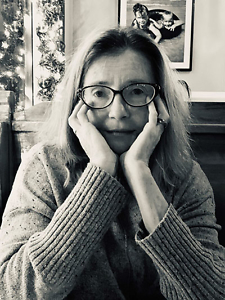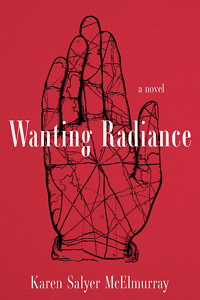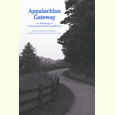I Would Have Said It Was Mystical
In Karen Salyer McElmurray’s Wanting Radiance, a daughter searches for her own buried origins
Fortune telling — through tarot cards, palm readings, or other means of divination — was a way of life for Miracelle Loving and her mother, Ruby, whose bond forms the heart of Karen Salyer McElmurray’s novel Wanting Radiance. But when we meet Miracelle, she’s been living the skeptic’s life for years.
 After 15-year-old Miracelle came home to find Ruby murdered, she soldiered on alone, continuing the itinerant fortune teller’s life the two of them had always shared. Now in her 30s, with no attachments and no address, Miracelle’s contempt for her work and her lovelorn customers has grown so strong that it obscures her view of all the mysteries of life, including love of any kind.
After 15-year-old Miracelle came home to find Ruby murdered, she soldiered on alone, continuing the itinerant fortune teller’s life the two of them had always shared. Now in her 30s, with no attachments and no address, Miracelle’s contempt for her work and her lovelorn customers has grown so strong that it obscures her view of all the mysteries of life, including love of any kind.
One night in a downtown Knoxville bar, Miracelle is plying her trade when she begins to hear Ruby’s voice, an “itching turned to words.” Occurring “in a way I would have said was mystical if I was into such things,” this visceral experience carries power that she cannot deny.
Ruby’s voice has returned to guide her, complicating Miracelle’s solo life. Sometimes that guidance is blunt — “Get on with it.” Other times, it points her somewhere unexpected. Digging through a trove of files and photographs in the backroom of her new place of employment, Willy’s Wonderama, Miracelle hears a haunting instruction: “If you want to know who you are, you might just find a clue here you can use.”
In her job as “wonder-finder,” which involves vetting unusual people and animals as candidates for inclusion in this “Ripley’s”-type museum, Miracelle stumbles onto clues about her own origins, including the possibility of learning for the first time who her father is. Every clue keeps leading her in the same direction — a small town called Radiance.
This beckoning from the past arrives just as Miracelle has reached a dicey threshold. Life on the road has always suited her, but lately the figure she cuts — a self-sufficient seer one step ahead of anyone who tries to get close — feels less confident, even false. She finds herself falling for someone, but the closer he gets, the more she balks. Still, she longs for connection, even though trusting others runs counter to everything Ruby taught her, which boils down to one central tenet: “You can’t trust love.”
 Miracelle had learned to view love as an “empty bottle you’d pitch out a car window as you drove alongside a steep, steep bank. Love was a page from a book, ripped out and torn into a million pieces and thrown away. Love was a no-name father, a man I wanted to know and did not want and wanted more than anything.” She sets out for Radiance determined to uncover the truth about her history. But underneath this search lies another desire — to make a new kind of future possible.
Miracelle had learned to view love as an “empty bottle you’d pitch out a car window as you drove alongside a steep, steep bank. Love was a page from a book, ripped out and torn into a million pieces and thrown away. Love was a no-name father, a man I wanted to know and did not want and wanted more than anything.” She sets out for Radiance determined to uncover the truth about her history. But underneath this search lies another desire — to make a new kind of future possible.
Most of the novel is told through Miracelle’s voice. However, McElmurray also includes shorter chapters written in lyrical third person. These chapters detail several characters’ experiences, but primarily Ruby’s. Her sections offer graceful insight into her origins and recount the early romance that thrusts her into adulthood.
Pregnant, Ruby departs from the path her parents expected and takes the first steps toward self-knowledge. Her labor brings a kind of ecstatic vision: “The world became a revelation, a before and after. A dream of what had never been but might, and in that dream she reached across the far space of the room. She reached into the far space inside herself and felt other hands there, her daughter’s hands, her child waiting to come alive.”
In such passages, Ruby’s story is moving, but also foreboding. We know from the novel’s opening pages that her young life ends in murder, lending every scene in Ruby’s chapters a tragic quality. For example, when Ruby feels a new sense of power after giving birth to Miracelle, “she laid her hands out flat and reached and reached. What would happen if her hands blossomed into pathways, ways out, highways she could follow to places she could now only imagine?” Such possibilities for liberation ultimately pass to Miracelle, who must choose what her troubled legacy will mean for her future.
“Love goes around and comes back,” according to a song written by Ruby’s father. “Flies out and brings me back to you.” The memorable characters of Wanting Radiance brave long, labyrinthine roads in order to search for the ones they love — or for their belief in love itself.

Emily Choate holds an M.F.A. from Sarah Lawrence College and is the fiction editor of Peauxdunque Review. Her fiction and nonfiction have appeared in Mississippi Review, Shenandoah, The Florida Review, Atticus Review, Tupelo Quarterly, Bayou Magazine Online, Late Night Library, and elsewhere. She lives near Nashville, where she’s working on a novel.


